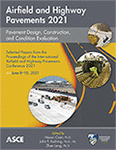Intelligent Pavement Roughness Forecasting Based on a Long Short-Term Memory Model with Attention Mechanism
Publication: Airfield and Highway Pavements 2021
ABSTRACT
The international roughness index (IRI) is one of the key indicators of pavement condition during its service life. Accurate IRI can assist transportation agencies in making maintenance decisions, identifying suitable maintenance approaches, and optimizing the financial plan. Although there are models which have been developed for predicting IRI based on artificial neural networks (ANNs), more features could be included and fused for model training to improve the performance. In this study, a long short-term memory (LSTM) model with an attention mechanism which is able to learn time-series related features with high efficiency and quality is developed to better IRI forecasting. The long-term pavement performance (LTPP) database is used for raw data extraction from different climate and traffic conditions. The prediction performance of different models including LSTM-attention (proposed), LSTM, Levenberg-Marquardt backpropagation (LM-b), and back propagation neural network (BPNN) is evaluated and compared with the pavement data from both South Carolina (SC) and Texas. The results show that the proposed model outperforms the other models on accuracy for both SC and Texas pavements, suggesting potential promising applications on the IRI.
Get full access to this article
View all available purchase options and get full access to this chapter.
REFERENCES
Abdelaziz, N., Abd El-Hakim, R. T., El-Badawy, S. M., and Afify, H. A. (2020). “International roughness index prediction model for flexible pavements.” International Journal of Pavement Engineering, 21(1), 88-99.
Bouktif, S., Fiaz, A., Ouni, A., and Serhani, M. A. (2018). “Optimal deep learning lstm model for electric load forecasting using feature selection and genetic algorithm: Comparison with machine learning approaches.” Energies, 11(7), 1636.
Dalla Rosa, F., Liu, L., and Gharaibeh, N. G. (2017). “IRI prediction model for use in network-level pavement management systems.” Journal of Transportation Engineering, Part B: Pavements, 143(1), 04017001.
Dong, Y., Shao, Y., Li, X., Li, S., Quan, L., Zhang, W., and Du, J. “Forecasting pavement performance with a feature fusion LSTM-BPNN model.” Proc., Proceedings of the 28th ACM International Conference on Information and Knowledge Management, 1953-1962.
El-Hakim, A., and El-Badawy, S. “International roughness index prediction for rigid pavements: an artificial neural network application.” Proc., Advanced Materials Research, Trans Tech Publ, 854-860.
Greff, K., Srivastava, R. K., Koutník, J., Steunebrink, B. R., and Schmidhuber, J. (2016). “LSTM: A search space odyssey.” IEEE transactions on neural networks and learning systems, 28(10), 2222-2232.
Gulli, A., and Pal, S. (2017). Deep learning with Keras, Packt Publishing Ltd.
Hall, K. T., Darter, M., Hoerner, T., and Khazanovich, L. (1997). LTPP data analysis. Phase I: validation of guidelines for K-value selection and concrete pavement performance prediction.
Hossain, M., Gopisetti, L., and Miah, M. (2019). “International roughness index prediction of flexible pavements using neural networks.” Journal of Transportation Engineering, Part B: Pavements, 145(1), 04018058.
Karandish, F., and Šimůnek, J. (2016). A comparison of numerical and machine-learning modeling of soil water content with limited input data. Journal of Hydrology, 543, 892-909.
Kargah-Ostadi, N., Stoffels, S. M., and Tabatabaee, N. (2010). “Network-level pavement roughness prediction model for rehabilitation recommendations.” Transportation Research Record, 2155(1), 124-133.
Sayers, M. W. (1986). The international road roughness experiment: Establishing correlation and a calibration standard for measurements. University of Michigan, Ann Arbor, Transportation Research Institute.
Schwartz, C. W., Li, R., Kim, S., Ceylan, H., and Gopalakrishnan, K. (2011). Sensitivity evaluation of MEPDG performance prediction.
Xie, P., Zhou, A., and Chai, B. (2019). “The application of long short-term memory (LSTM) method on displacement prediction of multifactor-induced landslides.” IEEE Access, 7, 54305-54311.
Information & Authors
Information
Published In
Copyright
© 2021 American Society of Civil Engineers.
History
Published online: Jun 4, 2021
Authors
Metrics & Citations
Metrics
Citations
Download citation
If you have the appropriate software installed, you can download article citation data to the citation manager of your choice. Simply select your manager software from the list below and click Download.
